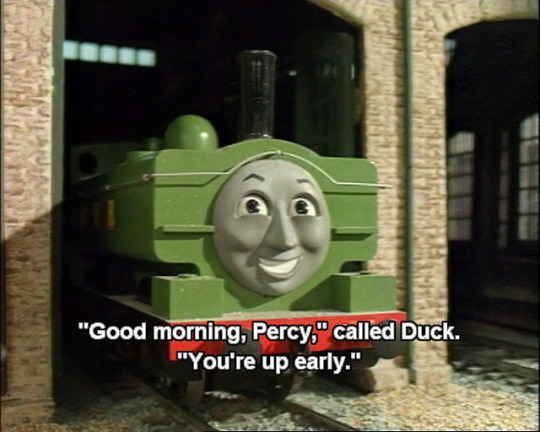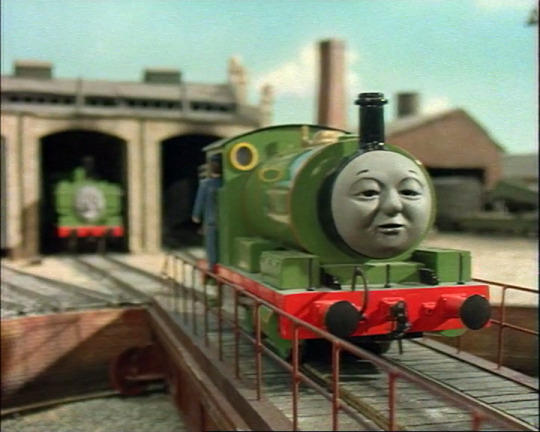Text
Musical musings - TTTE edition
One of the things that got me back into TTTE was the banger soundtrack and character themes. Music has always been a huge part of my life, I have classical training for the piano and an in-depth knowledge of musical theory and harmonic practices for classical music. So here are some of the things I noticed about various character themes and some of the engines' whistles.
Gordon is considered to be the biggest engine out of the main 12, and this could be reflected in his whistle, as it has the greatest interval between the two notes which make it up, that being a minor seventh between C and Bb.
James' whistle (G - C#/Db) is a tritone/Augmented 4th/Diminished 5th. In medieval times, this interval was considered to be a representation of conflict, discord (no, not THAT Discord) instability and danger. You can hear it in pieces like the iconic opening to Camille Saint-Seans' Danse Macabre, and in Hector Berlioz's La damnation de Faust to represent the titular character's arrival in Hell. James, I've noticed, is pretty damn insecure. He clings to his red paint like a lifeline and hides behind a veneer of arrogance and vanity. He can be quite boastful, to the detriment of his relationships with other engines, with him usually being the aggressor in conflicts with them. So I suppose the use of a tritone for his whistle is appropriate.
Percy appears to (mentally) be the youngest of the main 12, and this could be represented by having the highest whistle out of all of them.
Thomas' character theme and Edward's Series 2 theme both feature modulations to the parallel major of the initial key's relative minor, with Thomas' theme starting in F major and ending in D major, and Edward's theme starting in C major and ending in A major. The "relative minor" of a major key is the minor key which shares its key signature (ex. the relative minor of F major is D minor since they share the same key signature of one flat, likewise with C major, A minor and a key signature of no accidentals). The "parallel major" of a minor key is the major key which shares its 1st note (AKA, the tonic). So....like mentor, like mentee. Or like Father, like Son, in terms of musical themes.
Henry's theme is in a quadruple meter (following an 8-measure phrasing pattern, likely 12/8 time), meaning that there are 4 beats to a measure. However, each one of these "beats" consists of a triplet(If you were to count out a measure, it'd be 1-2-3 4-5-6 7-8-9 10-11-12, and you'd conduct it like 4 beats instead of each of the 12 individual notes) And Henry is the number 3 engine. Hmm.......
If I think of any more, I'll post 'em. If anyone even reads this lol
P.S: One of my favourite OSTs is Kingdom Dance from Tangled, and every time I listen it, I think of the twins. Probably because it uses the E Dorian mode (with a dash of E Mixolydian) which is common in Scottish music. Just in case anyone's confused, the "Dorian" mode is an 8-note scale which starts on the second note of a given major scale. (e.g, E is the 2nd note of a D major scale, so its Dorian mode uses the same signature of 2 sharps). The Mixolydian mode is an 8-note scale which starts on the 5th note of a given major scale. (e.g, E is the 5th note of an A major scale and thus, its Mixolydian mode uses the same key signature of 3 sharps).
youtube
75 notes
·
View notes
Text
So, after being reminded of the insanity that is Oliver Bulleid's Leader Class, and by extension some of the stranger aspects of Bulleid's engines in general, I have spiraled off into thinking of a new headcanon / additional bit of characterization for Rebecca.
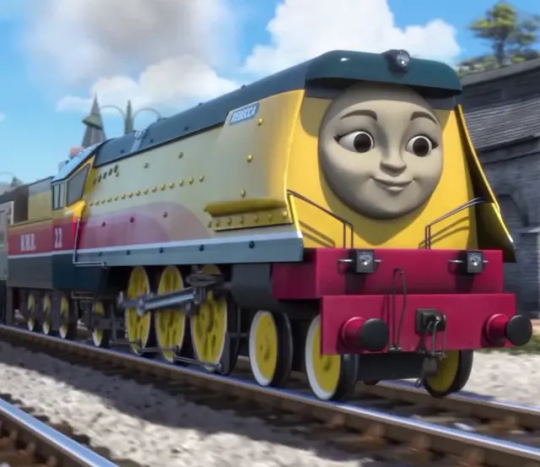
For anyone who doesn't know, Oliver Bullied was the Chief Mechanical Engineer for the Southern Railway starting in 1937, and is partially known for several of his designs featuring some unorthodox features, most notably his use of chain driven valve gear.
Rebecca is a Bulleid Light Pacific, so I feel it would fit to take some inspiration from the previous information about her builder, appropriately turned up to 11 for comedic effect and to fit the overall tone of the BWBA seasons of TTTE.
Consider:
Rebecca as a massive nerd / tinkerer / mad scientist of an engine, who is constantly experimenting with silly, outside the box, and very overly complicated solutions to problems, as well as just trying out various dumb ideas for the hell of it.
She notices her brakes are beginning to wear out and decided to try and extend the time before she has to get them fixed by instead stopping by throwing her wheels into reverse.
Pro: Less damage to brakes
Con: More damage to... everything else.
She hears about how the Skarloey Railway used to run gravity trains and decides to see how far the troublesome trucks can go on their own if released from the top of Gordon's Hill...
On the mainline...
Without telling anyone...
Maybe she spends a lot of time hanging around the Dieselworks of all places, because she's endlessly fascinated by the jury-rigged and patchwork repairs that have been made over the years to the work's equipment.
Den and Dart are confused by this, but feel very honored when Rebecca calls then "resourceful" and "innovative" for how they have kept the Dieselworks running.
There's even some support for this characterization in canon.
Rebecca is shown to be fascinated by the unique features of Harvey, Marion, and Belle in the episode What Rebecca Does and wishes she had something unique for herself.
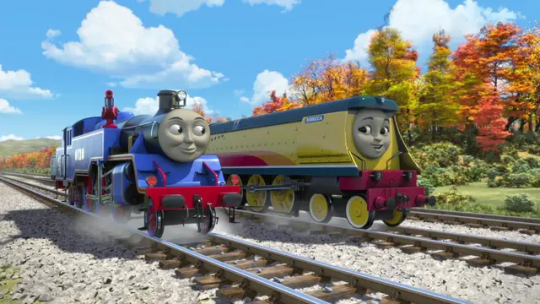
She seems to have an appreciation for unusual designs built to solve specific problems and do special tasks.
Then there's this quote from Rebecca's introductory scene in the episode Confusion Without Delay:
“Hello, sir. And, uh, sorry, sir. I miscalculated how long it would take me to stop…by, uh, quite a lot!”

The use of "miscalculated" feels like it fits with what I've laid out so far, like she actually tried to do the math in her head to come to a precise stop and it just didn't work out.
Now, is all of this very silly and a bit dumb?
Yes
But is it funny?
Also yes
Not only that, but there's honestly some pretty good story potential here.
Like, what if there was an episode with Rebecca and Duck?
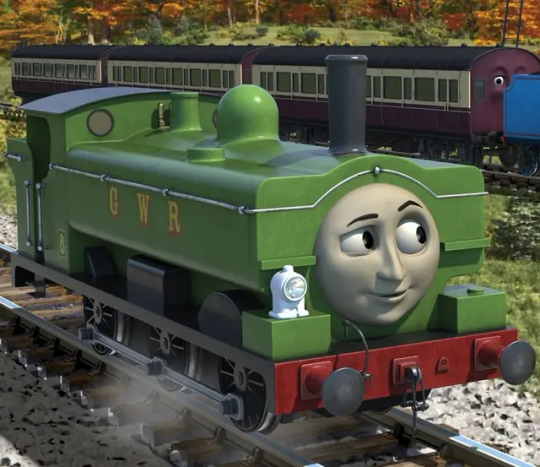
There could be a conflict between Ducks adherence to the tried-and-true and very practical Great Western Way, and Rebecca's desire to always think outside the box and try something new.
And Rebecca's trying to be respectful of and go along with Ducks way of doing things, but frankly she just keeps getting bored and ends up inevitably distracted with trying out he own new ideas.
Most of them don't work, and fail in comedic fashion.
But one of Rebecca's ideas actually looks like it could succeed...
Until Duck, but now tired of the delays to his work, interrupts and unintentionally causes the whole thing to fall apart.
The eventual resolution to this story could then come in the form of the Slip Coaches being brought into the mix.
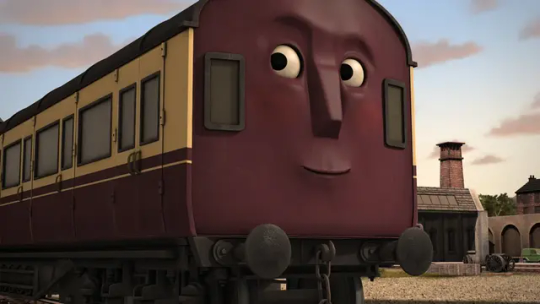
The Slip Coaches, who are a product of the Great Western Railway, and yet are also an example of a seemingly strange and outside the box idea, which proved to be successful when given the chance.
The story could then conclude with the moral of how some ideas that seem stupid might just need a bit of extra time and patience to develop and refine them into a practical application.
38 notes
·
View notes
Text
Before I forget,
Happy 35th Birthday to TUGS!
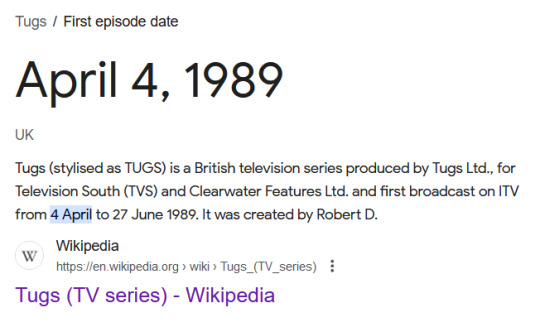

23 notes
·
View notes
Text
happy 4/4 look at these guys

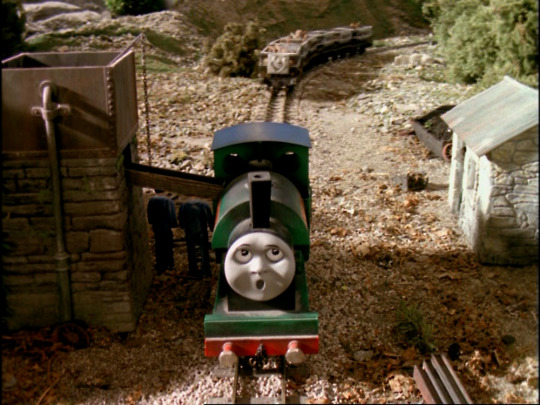

122 notes
·
View notes
Text
So we all know that Awdry originally had James as a GSWR Class 403 since it fit the description of an inside-cylinder mogul, but later changed James to be an English design. This post stems off the thought of "What If Awdry kept James Scottish?"
This whole thing was also brought on by @mean-scarlet-deceiver's Tales of the G&SW excerpts.
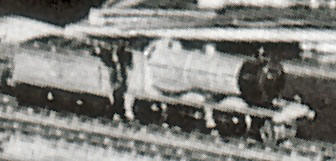
Beware, my writing of a Scottish accent is terrible, try not to cringe.
What If Scottish James
Written By: SparkArrester
1929
James was in a foul mood. Henry, like usual, failed. Now he was stuck with his coal train. That he had to arrange himself. Apparently the new shunter was busy with something that wasn’t shunting.
“Stupid Trucks, stupid coal, stupid everythingggg”, He moaned as he marshalled his train, “All that time being cleaned was a waste!”
The trucks, sensing an opportunity for mischief, made it their mission to give James the worst morning possible. They jammed their brakes, ran hot axles boxes, and some even derailed in the yard. The breaking point was when an old tippler’s front hatch flew open. Coal poured out onto the rails, and onto James, coating his front end. The trucks all burst out laughing, but they were soon cut off.
“Yee wretched little INGRATES!”, Burst out James in a perfect scottish dialect, “Ye all oor jus’ little devious muckle nuisances that are no fit ta scrape ta scale oof me boiler, ye little wee gobshites!”
This continued for some time, until James heard a familiar whistle, and immediately blanched. Percy rolled in looking gobsmacked.
“Err, uhh, hey James?”
“Wha arr ye -ahem- what are, uh, you doing here Percy?”
“Coming to take over the shunting.”
“Ah, right.”
“...”
“... Percy.”
“Yes?”
“Please don’t tell anyone…”
“James, I’m pretty sure everyone on this side of the island heard you.”
“... Dang it.”
1951
James sat there, covered in tar. His crew had already gone to the station to phone for help, and one of the old Suddery Tanks brought a crane to assist. He was hoping for an engine like Edward or Henry to tank him away. In the meantime, quietly grumbling to himself was good enough. In fact, he was so absorbed with himself that he forgot his surroundings.
“Stupid wee muckle nuisances…”, he muttered, “Stupid Toby. If ‘e wasnae a huge prat my red coat wouldnae be in ruins. Honestly, those wee branchline engines are nothing but great big pieces ‘o-”
A ring of a bell broke him out of his thoughts. He jumped back as he realized Toby and Percy were right beside him. He prayed they hadn’t heard him. They did.
“Ark ay Percy!”, Chortled Toby in a terrible Scottish accent, “Whatever isnae that dirty object!”
“That isn’t even how you use isnae…”, muttered James, but of course they took no notice.
They continued speaking in terrible accents all the way to the sheds. James didn’t know if he should be angry at their teasing, or their complete butchering of his old dialect (one he had tried his hardest to shake), so he settled for both.
1959
The Fat Controller had brought a new goods engine to help out. James was glad at first, now someone else could work the pick-up goods while he got more passengers. He had heard that there was something up with the new engine when it had arrived, but he didn’t put much stock into it. Later in the day, he was backing down on what would hopefully be his last pick-up goods in a while when he heard a whistle. A deep-toned whistle that he had not heard in years. James grimaced as a Caledonian steam engine pulled up on the adjacent line, giving him the stink eye.
“Well Well Well…” The Caledonian spat, “A Sou’-West engine. And one of Pee-Wee Drummond’s oven-boxes! Ah hoped we saw the last ‘o ye back ‘ome!”
“The feeling is most certainly mutual!” He replied with vitriol that wasn’t really there. He hoped to leave everything pre-sodor behind. But of course it had found him. At least he still had a slight bad opinion towards the Caledonian, it did him good in this confrontation.
“Ark aye!”, Exclaimed the Caledonian, “Why do ye soond like tha?”
James was taken aback, “Like what?”
“There it is again! Aye Douggie!”
The question of who “Douggie” was got itself answered quickly, when an identical Caledonian engine pulled up besides the first.
“Aye Donnie. What’s up!”
“Wait wait, just let that Sou’-West engine speak!”
James defiantly shut his mouth, but then his crew chose that exact time to ask him something. He replied as quietly as possible. But not quiet enough.
“O Aye!” Exclaimed “Douggie”, “He soonds like a wee sassenach!”
James went red in the face, “Well! I-I-I-”
“Tha accent is ass!” Chortled “Donnie”, and soon “Dougie” joined in.
They continued until James left, his face matching his paintwork. He put a good few months practicing his accent, and it was hard. He now figured out what exactly was up with the new engine: there were two of them, and they both sucked.
#reblog#ttte#rws#ttte james#ttte percy#ttte donald#ttte douglas#ttte toby#what if scottish James#this is brilliant#very funny
85 notes
·
View notes
Text
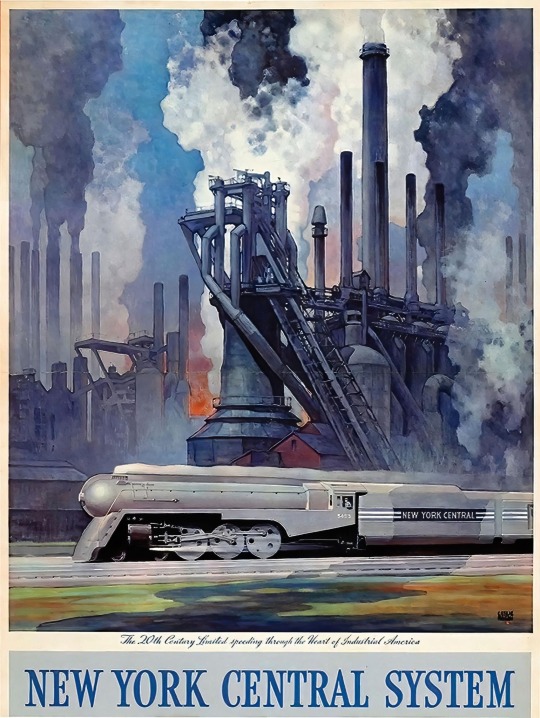
Poster designed by Leslie Ragan, c1940
698 notes
·
View notes
Text
Wanted to bring attention to the fact that Bisan called for mass protests today (April 1st). It’s okay if you can’t march yourself, but please make it a point to spread this so that those who can march do so—and also take this as your own checkpoint to ask yourself if you’ve been faltering in terms of sharing information about Palestine, doing what you can to fund humanitarian aid in Palestine, and staying informed as to the ongoing genocide in Palestine. Some might say it has been 6 months of this, but to me that’s all the more reason to make noise now more than ever. This is one of very few spaces on the Internet where Palestine has not been abandoned in people’s endless efforts to dehumanize Arabs. Please continue amplifying the dialogue surrounding this genocide. Free Palestine. Free Palestins always.
24K notes
·
View notes
Text
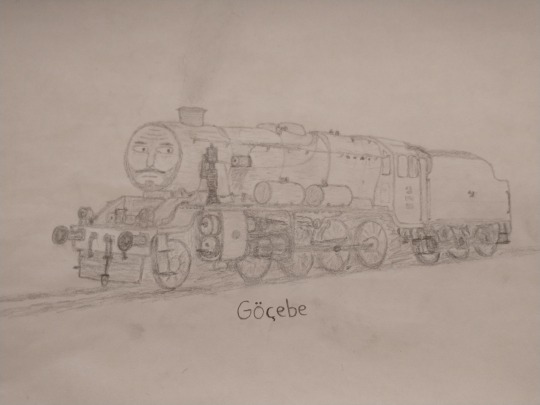
Realized I've never shared this guy here. This is one of my attempts at an engine OC.
I really like the look of the 8f's that got shipped to Turkey during WW2, so Göçebe here is based off of them.
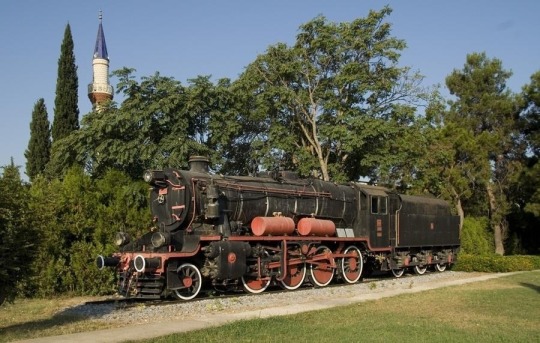
The main reason I've never really done anything with him so far is because I keep going back and fourth on a lot of the details of his story. his character has so far never fully settled into something I'm 100% happy with.
Still though, I like him, and researching his basis lead me down a rabbit-hole of learning more about Turkish steam engines in general, so I figured it was about time I let people know he exists.
Technically this isn't the first time he's appeared on this blog actually. He's in the background sitting in the sheds in that one drawing of a Skyliner I did a while back.
#ttte#rws#ttte oc#ttte oc: göçebe#turkish railways#I'm happy to explain what details of him I have settled on if people are interested#his initial backstory is pretty firmly set#It involves convoluted workarounds to fit the Turkish State Railway's numbering system
6 notes
·
View notes
Text
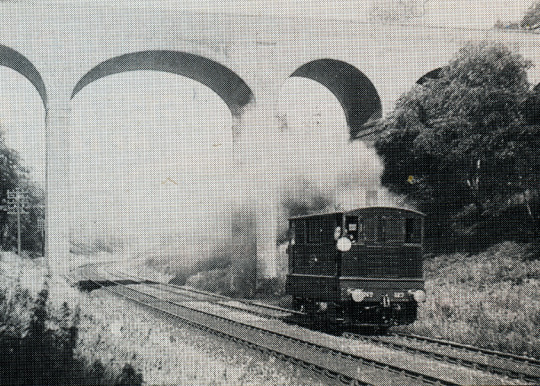
Great Eastern Railway C53 class steam 'tram' engine on its very first journey in June 1914. Scuttling up the main line from Stratford Works to its home base at Ipswich.
It would survive until 1951
85 notes
·
View notes
Text
Bulleid's Proposed Locomotives
So it turns out Bulleid had so many of his designs dropped for one reason or another, and since I can't stick with a single project for more than a few seconds, I wrote up histories for all of them!
Enjoy the ramblings of a madman who spent a good long while finding free number slots for them.
Southern Railway Warship Class
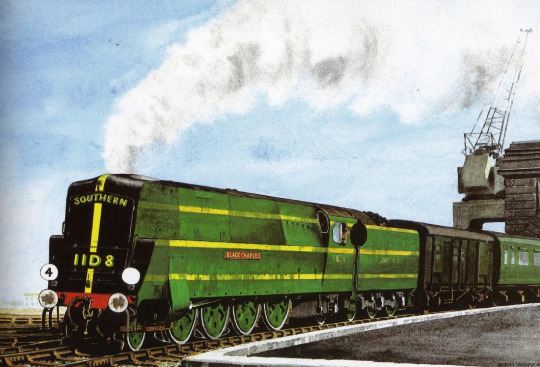
The Southern Railway was the most financially successful of the "Big Four", but this was largely based on investment in suburban and main line electrification. After the successful introduction of the SR Schools class in 1930, the railway had lagged behind the others in terms of modernizing its aging fleet of steam locomotives, as they were more focused on Electrification. Following the retirement of the general manager of the Southern Railway Sir Herbert Walker and Richard Maunsell the Chief Mechanical Engineer (CME) in 1937, their successors considered that the time had come to change this situation. In March 1938 the new general manager Gilbert Szlumper authorized Oliver Bulleid, Maunsell's replacement, to prepare designs for twenty express passenger locomotives. The deteriorating international situation prior to the Second World War was an additional factor in this decision.
Originally, Bulleid had wanted a 4-8-2 Mountain Type, but the Civil Engineering department had resisted this based on size and weight, so a 2-8-2 was chosen instead. Bulleid had worked with Gresley on his P2 2-8-2 express engines, so he already had some background knowledge, especially with the P2’s problems and ideas on how to solve them. Of course, due to the war, they were classified as heavy mixed-traffic engines to get around wartime regulations.
They were built with high-pressure 280 PSI boilers and three 18inx26in cylinders, as well as being the first engines to use Bulleid’s chain-driven valve gear, though the middle cylinder had to be inclined steeply to clear the first driven axle. The boiler was partly welded to save on cost, and the inner firebox was made of steel. The Southern had no facilities to build these boilers, so it was subcontracted to the North British Locomotive Co., as well as Beyer Peacock. They were also fitted with Bulleid’s Air-Smooth Casing. Unlike later designs that utilized this, the casing on the Warships both served their function purpose as labor saving as well as being able to be passed off as some sort of streamlining. How Bulleid got that one through during the war is a mystery! The Warship’s were also the first to use Bulleid’s Firth-Brown Wheels.
10 of these engines were constructed in 1940. More were set to be produced, but once again, the Civil Engineering Department expressed their discomfort at such a large engine running at high speeds with only a single pony-truck in front, despite other engines of a similar design getting on fine elsewhere. This would lead Bulleid to designing and building 30 of his well-known Merchant Navy Class 4-6-2s.
They were named after Warships as a way to increase morale, with 11D1 being officially named “Dreadnought” in April 1940. They performed well in service, hauling heavy passenger and express goods, though the Chain-Driven valve gear was sensitive and required high maintenance, as well as the oil-bath having leaking problems, contributing to wheel-slips(Though the extra wheel helped negate this as well). The casing, while it did save on labor during cleaning, and the more streamlined appearance helped with publicity, it made maintenance hard to carry out. Surprisingly, thanks to their different front ends, they never really experienced drifting smoke like Bulleid’s Pacifics.
All 10 of the engines would be passed into British Railways, numbered 37001-37010, where their duties mostly stayed the same. 11D8 “Black Charles'' took part in the 1948 locomotive exchange trials, where it was compared to LMS Duchess pacifics and LNER A4’s and A2/2s, where it performed favorably, though the chain driven valve gear and its oil bath still caused headaches. After the Crewkerne incident, BR chose a rebuilding program of any engines that still used Bulleid’s Chain Driven motion, however, as the Warships had required far less modifications that the Pacifics, they were on the bottom of the list in the rebuilding program. In the end, only 37003 “Triumph”, 37009 “Warspite”, and 37010 “Exeter” were rebuilt in 1956, 1957, and 1959.
Despite their status as a class with very few engines, all ten would survive until the end of southern steam, going between 1965-1966.
Two are preserved, both being rescued from Barry Scrapyard in Wales. These examples are Class Pioneer 11D1 “Dreadnought”, as well as 11D3 “Triumph”.
Stats
Power Classification - 8MT
Built - 1940 to 1941
Boiler Pressure - 280 PSI
Cylinders (3) - 18in x 26in
Wheels (Driven) - 6ft 2in
Wheels (Leading) - 3ft 1in
Wheels (Trailing) - 3ft 7in
Wheels (Tender) 3ft 7in
Tractive Effort - 40,640 lbf
Total Length - 74ft 8in
Fleet
11D1 (37001) - Dreadnought
11D2 (37002) - Anson
11D3 (37003) - Triumph
11D4 (37004) - Vanguard
11D5 (37005) - Ark Royal
11D6 (37006) - Audacity
11D7 (37007) - Valiant
11D8 (37008) - Black Charles
11D9 (37009) - Warspite
11D10 (37010) - Exeter
Southern Railway Prototype Light Pacific
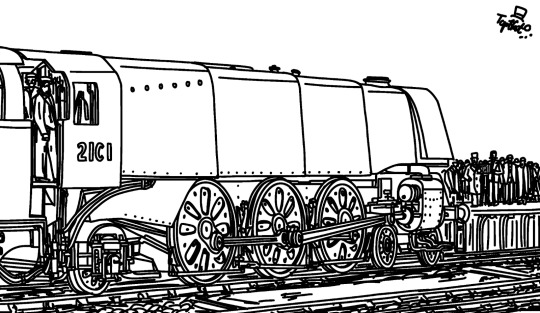
(Pic by Sttophat on twitter)
In 1941, Bulleid had introduced his Warship Mikado's and Merchant Navy Pacific's to become the main motive power for the Southern Railway’s Express passenger trains, though while they performed well, they were restricted by their weight, especially since the condition of the rails were hampered by the Second World War. Initially, trains on the lighter sections were handled by the Q1 0-6-0 freight engines and other, older engines, but they couldn’t handle the faster trains that were anticipated after the war. There was also the planned electrification of certain areas after the war, so the new design also needed to handle freight traffic as well, fast enough to not impede electric services.
What was decided on in the end was a downsized version of the Merchant Navy’s, fitted with the same design theory of the Q1’s to create a “Light Pacific”. The Locomotive was completed in 1942 alongside the Q1’s, and was trialed for a short time before entering service. It was deemed a success, and numbered 21C201. It was powerful enough to handle fast, heavy trains, as well as having an extremely light axle loading for a pacific at 16.5 Tons, enabling it to be used on almost every part of the UK Network as a whole. However, Bulleid decided to go with a different approach, creating simply a downsized Merchant Navy with no Q1 elements. This would increase the axle load, though this wasn’t much of an issue, as the Battle of Britain and West Country Class Light Pacifics still had a high enough route availability for the work they were assigned. Thus, the “Q1 Light Pacific'' would remain a one-off.
During the war, No.21C201 would actually travel a fair amount, and would regularly venture out of Southern territory, its light axle-load coming in handy. After the war however, it would mostly stay in the South. Performance-wise, it seemed to inherit all of the good qualities from the Q1’s and the pacific’s. The light-weight was already a plus, coupled with a great, free-steaming boiler and additions that made the driver and fireman’s life easier. However, it also inherited the bad aspects as well. The chain-driven valve gear was a well-known headache on bulleid locomotives, but there was also the issue that its light-weight caused. The regular Light Pacifics had trouble starting heavy trains thanks to their weight, but No.21C201 had it worse, especially with the well-known issues with the oil bath the valve gear was situated in. The light weight would also affect braking power as well, making unfitted trains harder to stop, a trait inherited from the Q1’s.
No.21C201 (Now Renumbered 34000) was not considered for rebuilding like the other Bulleid Pacifics due to its one-off status. It would be given a general repair in 1960 before spending the rest of its life at Nine-Elms, mainly working express and semi-fast goods trains and the occasional passenger turn during peak period and summer excursions. It was withdrawn from service in 1966 and broken up at Eastleigh.
Stats
Power Classification - 6MT
Built - 1942
Wheels (Driven) - 6ft 2in
Wheels (Leading) 3ft 1in
Wheels (Trailing) - 3ft 7in
Wheels (Tender) - 3ft 7in
Boiler Pressure - 250 psi
Cylinders (3) - 16.5in x 24in
Tractive Effort - 28,145lbf
Total Built - 1
Southern Railway L1 Class
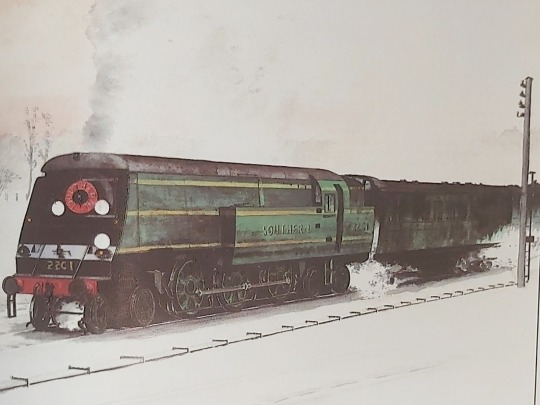
Bulleid designed these locomotives during the Second World War, but construction didn’t begin until 1946. They shared many components with Bulleid’s Q1 0-6-0 goods engines, and were essentially the Q1’s with an Air-Smoothed Casing and a bigger boiler (though the firebox was identical with that of a Q1’s).
Twelve of these engines would be constructed between 1946 and 1948, with the final 3 being built by British Railways. They were originally numbered 22C1 to 22C12, though they were renumbered in 1949 to 36101 to 36112. They were originally meant for short distance goods and passenger services, though they never really found their footing in this role. The passenger trains that usually necessitated big tank engines were already being handled by electric engines, and everything else usually required smaller and lighter engines, which meant that, despite inheriting the power and efficiency of the Q1, the added weight and size meant that they were barred from where they could be most effective. The goods work they were meant for were also in the care of both Q1’s and Maunsell’s Q Class, as well as the many N class moguls already in service. In the end they spent their time hopping from shed-to-shed before settling on ex-LSWR territory, and even venturing into Western Region territory.
They were withdrawn between 1962-1964. Only one survives, 22C9 (36109) on the Bluebell Railway.
Stats
Power Classification - 5F 4P
Built - 1946 to 1948
Boiler Pressure - 230 PSI
Cylinders (2) - 19in x 26in
Wheels (Driven) - 5ft 1in
Wheels (Bogies) - 3ft 1in
Tractive Effort - 30,080 lbf
Southern Railway Dock Class
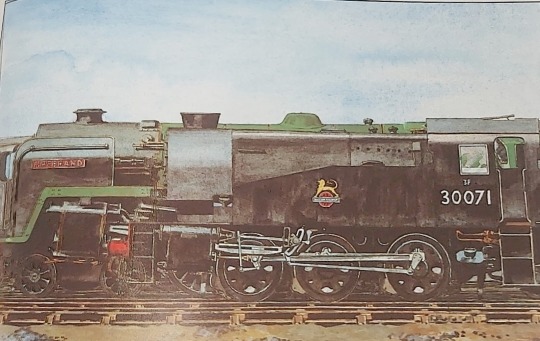
After the Second World War, many of the Southern Railway’s shunters (mainly those at Southampton) inherited from pre-grouping companies were worn out and needed overhauling. As such, Bulleid opted to replace them outright with his own design of 0-6-0T, with a short wheelbase of 10 feet to enable it to negotiate the tight curves. Like many of Bulleid’s designs, he equipped it with a relatively high boiler pressure.
Six would enter service in 1946, and while a total of 18 were planned, this would never come to be, as Eastleigh works was not in a position to build new locomotives with the backlog from the war. In the end, the southern found it cheaper to purchase ex-USATC S100 dock shunters, as they fulfilled most of the requirements needed.
They were numbered C201 to C206, and were renumbered to 30071 to 30076 in British Railways days. The first, 30071, was built with the Idaglass boiler lagging and casing as used in the Q1 class, while the other 5 were built with conventional boiler lagging and tanks. 30071 would be rebuilt like the others in 1953.
The class would lead uninteresting lives as dock shunters in Southampton and Dover until their withdrawal between 1961-1962. One was initially purchased for preservation but the deal fell through. None are preserved.
Stats
Power Classification - 3F
Built - 1946
Boiler Pressure - 220 PSI
Cylinders (2) - 16in x 24in
Wheels (Driven) - 4ft 6in
Tractive Effort - 21,276 lbf
47 notes
·
View notes
Text
There's more for anyone who's interested (From the IOS book's segment on Cas-ny-Hawin):

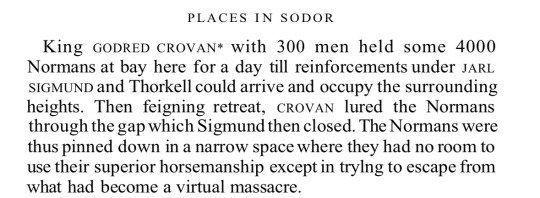
I love sodor lore so much tf does this have to do with thomas the tank engine
121 notes
·
View notes
Text
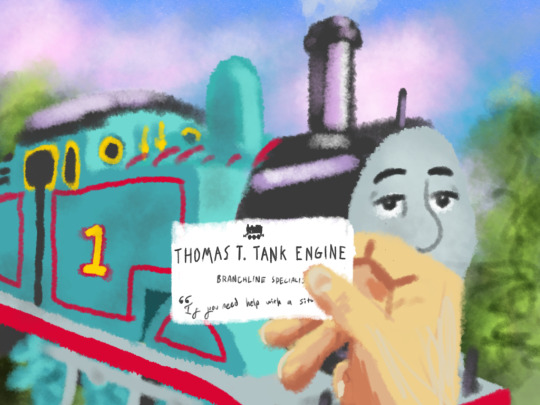
pov thomas is giving you his business card
375 notes
·
View notes
Text
so. um. @mean-scarlet-deceiver's post about thomas and henry's relationship has been living in my brain rent free for the past month and i have been turning over a scene for just as long.
so. i tried to write it. i hope you don't mind, jobey. and also you're right. they are Hard to get right. if i had to put an era on this i'd call it BG (Before Gordon).
about 1.5k, full fic under the cut
--- --- ---
Thomas keeps shooting glances at the sheds as he bustles around the yard.
It… the hired help from the other railway, the engines who are slightly too full of themselves for Thomas’ liking (and he’s made sure to let them know as such) have been talking loudly all morning, as they were getting ready to take their trains, about… the new engine.
Henry. Even if he couldn’t have remembered Henry’s name, the other two have been saying it loudly enough to carry around the yard that Thomas certainly has the picture now. And… Thomas’ lip curls as he hears their newest comment as he goes past.
“Hey!” he calls, boiling over, and the two hired engines look at him. “It’s 9am already. Are you going to actually go take your trains, or are you just going to sit and preen all day?”
“What would you know, little Thomas?” one of them calls back, all smarmy and smug. Thomas’ lip curls even more into a full on frown. Eugh. Tender engines.
“About running a railway on time?” Thomas snaps back. “Clearly more than you! Are you waiting for Sir Topham Hatt to personally invite you, or?”
They huff and sneer and pout at him, but they do still steam off one by one. However, they each shoot Henry a knowing and cruel side-eye as they go that makes Thomas bristle, despite himself.
Henry is still in his berth in the sheds. Well, he’s half-in, half-out. He only seemed to have made it so far before he… stopped. And he’s been going all sorts of shades of red as the others’ gossip had gotten louder and louder as he waited for his driver to return with an engineer of some sort.
Henry isn’t looking at Thomas now, but his eyes had snapped to the tank engine when Thomas had spoken up. He’s instead closed his eyes, puffed out his cheeks, and seems to be trying – and trying hard – to… to what? To move?
Thomas tries not to stare, as he moves trucks into the siding they’re expected to be found in. Why is he trying so hard?
Eventually, Henry does actually move – but he… Thomas frowns again. Henry moves backwards, back into the shed. The wheesh Henry lets out as he comes to a halt is limp and weak.
Henry has been here, what, all of a month, maybe two at this point. Thomas hasn’t heard… many kind things, actually, so far, which is weird because look at him. Henry’s huge – Henry’s the biggest engine Thomas has ever seen, and he’s surely powerful to boot.
But Henry… Well, Edward said that Henry is sick, and sick often.
“Why?” Thomas had asked, as they had approached the shed. “What’s wrong with him?”
“Thomas,” Edward had reprimanded, and that’s when Thomas had realised Henry was in earshot, and clearly trying to pretend he wasn’t.
And that had been that.
Thomas had seen Sir Topham Hatt come out of his office at the station to watch Henry’s comings and goings, and more often than not with a stormy expression on his face. And Thomas didn’t get that either. Problems get the stormy expression. Troublemakers get the stormy expressions (Thomas would know). And Henry seems… too…
Thomas biffs his truck ahead of him as he turns his thoughts over.
Too… quiet? Too wallpaper? Too chameleon? Too…?
He snorts to himself. Whatever Henry is, he’s too much of it. And certainly too much of it to be a troublemaker, not like those mainline engines. It’s not like Thomas has gotten to know Henry yet, and it’s not like Henry has given him the opportunity to, either: but Thomas doesn’t get the impression Henry wants to be trouble. But he has to be… there has to be something wrong here, otherwise the Fat Controller wouldn’t be so upset.
Thomas hears a sniff from behind him as he backs down his stretch of track, and realises it’s come from the sheds.
And Thomas sighs quietly. …Then again, if nothing was wrong, Henry wouldn’t be so upset either.
“Those two,” Thomas says, before he can think, and Henry has gone absolutely silent, eyes flicking over to Thomas as Thomas pauses on a nearby siding for just a moment. “Bloody wankers, the pair of them.”
The silence holds for another second or two, before Thomas is rewarded with a shaky laugh.
“…I noticed,” says Henry.
“All those mainline tossers, really,” Thomas continues, and he keeps talking even as his work takes him all around the yard, speaking up so Henry can still hear him. “I almost wish the Fat Controller wouldn’t hire them. Sure, we need more wheels on rails, but they don’t seem to know a blazing thing about this railway.”
Henry – in the shadow of the shed – purses his lips, before he lets out another sigh, another limp wheesh of steam.
“I would hardly say I do, either,” he says miserably.
Thomas frowns, and comes to a halt a little too sharply with a big woosh of steam.
“Of course you do,” he replies, indignant. Henry’s a big engine, he should- why would he say that? Sure, Henry hasn’t been here long, but he’s a big engine, he should know plenty. “More than them, anyway.”
Henry sighs. He doesn’t argue, but Thomas’ fire flickers in annoyance as he can read of Henry’s face that Henry doesn’t agree either.
“I mean, you wouldn’t have been bought if-”
“Don’t.”
Thomas’ mouth hangs open for a second, before he closes it, blinks, and glances at Henry.
Henry looks even more upset. Great job, Thomas.
“I’m just saying-”
“Well, don’t,” Henry cuts him off again, sounding grumpier. And he’s gone from miserable to grumpy – that’s a win in Thomas’ book. “I’m particularly not in the mood to hear how I’d be more useful as a tin can.”
“The only tin cans around here are those self-important mainland pricks,” Thomas shoots back, and Henry side-eyes him – suspicious. “I’m not convinced they know what a timetable is, let alone how to read one. What kind of engine hangs around in the sheds when there’s work to… be…?”
Thomas trails off, and Henry… actually laughs. It’s tired and it’s bitter, but it’s a real laugh and it’s better than miserable.
“…Well, I want to assume you’re going to go work. When you can.”
“Optimism,” Henry says dryly. “I admire that in an engine.”
Thomas scrunches up his face. “I don’t understand you,” he says bluntly, in a way he’s sure Edward would scold him for if he was with them. “You’re miserable in the sheds, you’re miserable out on the line, you’re miserable doing nothing and you’re miserable pulling trains.”
Henry stares at Thomas for a moment, before his eyes flick away.
“If I could get out of this yard and actually pull trains, I’d do it in a heartbeat,” Thomas says, far more dreamily than he’ meant to, and he cringes a little, chuffing out of where he can see Henry’s face, because he doesn’t need to hear an earful about it from another big engine.
“…You’re small,” Henry says, slowly, not accusatorily nor really condescendingly. He sounds more …confused than anything. “…And you’re useful, here.”
“And?” Thomas snaps back, defensive. “I could be useful anywhere.”
Henry’s silent for another moment, like he’s really chewing that statement over.
Then, eventually, he surprises Thomas by saying, “…I suppose you would be better than those two.”
And Thomas lets out a sharp bark of laughter, shooting Henry a grin as he goes by, and punctuating it with a hoot and a whistle – delighted. The enthusiasm makes Henry blink, before slowly, a smile of his own spreads across his face; one that sharpens to match Thomas’.
“You’re most certainly right! And besides. You let them get to you, you let them win,” Thomas agrees. “And they’re far too useless for that.”
Henry laughs again. Thomas lets out another peep-peep and a woosh of steam of his own, pleased to have earnt it. Footsteps crunch over the gravel of the yard, and Thomas spots Henry’s driver returning with a couple of engineers in tow before Henry does, and replies to their hellos as he bustles past.
“Hello, lad,” Henry’s driver says to Henry, patting his side. “We’ll have you right as rain in no-time, alright?"
Henry sighs again, but does actually smile back at his driver.
His driver blinks in fond surprise as the engineers get to work finding the newest problem. “You’re in good spirits, all of a sudden.” Then, he glances at Thomas as the tank engine goes past. “Making friends?”
“More so finding the only engine in this yard with a thought in his smokebox, it seems,” Henry says dryly, loud enough for Thomas to hear, and that makes Thomas snort in amusement.
He does call back, “Hey, now, be nice to Edward!”
And the engineers and Henry’s driver alike seem relieved when the two engines laugh together.
Thomas watches them work to get Henry’s steam up, and Henry’s finally pulling out of the sheds a good half-hour later. Thomas whistles goodbye as Henry chuffs away.
He smiles with the satisfaction of a job well done when Henry, completely of his own volition, whistles a goodbye in return as he disappears off down the line.
Then, Thomas returns to his trucks, and gives them a good biff once more, ignoring how this time, they really shriek. He – and Henry, he imagines – can’t wait for those mainlanders’ contracts to run out.
#reblog#ttte#rws#ttte thomas#ttte henry#this is amazing#Thomas and Henry are both perfect here#Brilliant work!
65 notes
·
View notes
Text
FOUND family??? you think i just found them like this??? babes this is FORGED family. Me & the bros were scrap metal in a junkyard (very valuable, very sharp, very dangerous, uncared for) and we GOT IN THE FUCKING FIRE TOGETHER. WE did this. we said I AM NOT LEAVING YOU and melted into each other for better or for worse (it’s for better) and we are A FUNCTIONAL UNIT now. DO NOT SEPARATE. BATTERIES FUCKING INCLUDED. FOUND family my ass, we built this non-nuclear family unit from the ground up, don’t devalue this!!! it was is and will be a labour of love!!!
55K notes
·
View notes
Text
youtube
While I'm in an Emily mood, I may as well just share this ☝️ Magnificent documentary work, and features wonderful footage of Stirling Single No. 1.
I knew that the Great Northern Singles had the pretty glamorous job spearheading the express services up to Scotland and repping their company in the Great Races—
But here are some details I didn't know, and, from the perspective of Emily's characterization, they are just fascinating:
1. On an occasion where an engine ran less than one minute late on the express service, the G.N.R. made a point of apologizing profusely and citing "beastly weather" for the unconscionable delay.
2. Stirling did not put a front coupling link on this class because he expected that they would never need to be helped by another engine. Ever.
Um.
WOW?
Emily the New Build might be on the wayside in my personal headcanon—the notion of Emily the Ex-Top Link Golden Child trying to re-learn everything she knows about life after those insanely high-pressure expectations is in.
#reblog#ttte#ttte emily#Stirling expected they would never need help from another engine#wow#Yeah I'm now even more in favor of Emily having arrived early in the NWR's history#Thomas is presumably shocked and insulted when Emily refuses his help pushing her train out of the station.#And then there's how Emily would presumably have reacted to overhearing TFC say he's looking for an Atlantic for the railway#Only for the “Atlantic” in question to turn out to be Henry
83 notes
·
View notes
